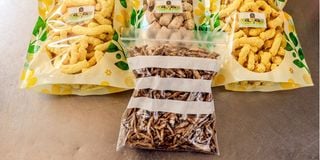
Packed Omena snacks at JKUAT Food Science and Technology workshop on October 1, 2024.
Jomo Kenyatta University of Agriculture and Technology (JKUAT) is betting on its omena snacks project to promote consumption.
The small fish, known as silver cyprinid, is rich in nutrients but is seen as a poor man's meal. Now, the university is making it more flavourful and packaging it as a snack.
The fish is processed into various products, including cereal-based snacks, noodles, dried marinated omena, and deep-fried varieties.
JKUAT sources the omena from Lake Victoria and blends with cereals like maize, cassava, millet, and wheat.
“We eliminate the fish aroma and make the snacks crunchy,” said Prof Nelson Ojijo from JKUAT’s Department of Food Science and Technology.
The snacks are also sweetened with sugar. The two-and-a-half-year initiative, according to the researcher, aims to promote omena consumption, particularly among children and young adults.
Silver cyprinid is rich in protein, polyunsaturated fats, omega-3 fatty acids, and minerals like calcium.
The omena value-addition project, launched in 2022 was funded by the European Union (EU) and the United States Agency for International Development.

Packed Omena at JKUAT Food Science and Technology workshop on October 1, 2024.
“Fish farming, if fully explored through value addition, can significantly boost the country’s Gross Domestic Product growth,” Prof Ojijo said.
JKUAT secured Sh35.4 million (euros 250,00) from the EU, with an additional Sh58 million ($50,000) allocation to the project.
Prof Ojijo said they are working with farmers from Busia and Kisumu.
“We selected Marenga Omena Beach in Busia County and Dunga Beach in Kisumu as project sites, where we train fishermen on adding value to the delicacy,” Prof Ojijo said.
He said they have been sourcing a 25-kilo bag from each beach per month.
Poor drying and storage infrastructure forces fishermen to rely heavily on middlemen.
“For instance, if you visit Marenga Beach, you will be surprised to find that fishermen dry omena on the ground, which raises serious safety and hygiene concerns,” said the scientist.
Additionally, the traditional methods lead to significant post-harvest losses.
Fishermen lack proper infrastructure for drying their catch, often spreading nets on the ground to dry the fish, which becomes problematic during the rainy season.
Due to poor storage and drying infrastructure, Prof Ojijo estimated that fishermen lose over 50 per cent of their produce, especially during the rainy season.
“This has significant implications for food security, safety, and the trade of the fish,” he said.
JKUAT has since constructed hybrid solar dryers at each beach, with plans to build more units across beaches in the Nyanza and Western regions.

Prof Nelson Ojijo Olang'o from Jomo Kenyatta University of Agriculture and Technology during an interview at JKUAT Food Science and Technology workshop on October 1, 2024.
The price
With the modern units, it takes just two hours to dry omena on a bright sunny day, compared to eight hours using conventional methods.
While Lake Victoria is home to a variety of fish species, omena accounts for about 40 percent of the fish harvested, highlighting the untapped economic potential.
The current production volume is 25 kilos of blended flour per hour, producing approximately 800 to 1,000 packets of 100 grammes each.

Extruded Omena Snack pictured at JKUAT Food Science and Technology workshop on October 1, 2024.
However, Prof Ojijo said the capacity could increase if they procure a commercial extruder machine.
“We are seeking investors to help scale this operation to a commercial level,” he said.
Prof Ojijo revealed that the project was in the process of obtaining Kenya Bureau of Standards certification, and once approved, the products will be available on supermarket shelves.
A 100-gramme pack of the snacks will be sold at Sh100.







